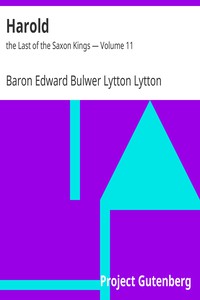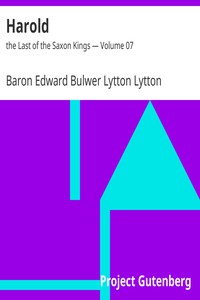Harold : the Last of the Saxon Kings — Complete by Lytton (good books for 8th graders .TXT) 📗

- Author: Lytton
Book online «Harold : the Last of the Saxon Kings — Complete by Lytton (good books for 8th graders .TXT) 📗». Author Lytton
To outward appearance, by this election, the House of Leofric—uniting in father and son the two mighty districts of Mercia and the East Anglians—became more powerful than that of Godwin; for, in that last House, Harold was now the only possessor of one of the great earldoms, and Tostig and the other brothers had no other provision beyond the comparatively insignificant lordships they held before. But if Harold had ruled no earldom at all, he had still been immeasurably the first man in England—so great was the confidence reposed in his valour and wisdom. He was of that height in himself, that he needed no pedestal to stand on.
The successor of the first great founder of a House succeeds to more than his predecessor’s power, if he but know how to wield and maintain it. For who makes his way to greatness without raising foes at every step? and who ever rose to power supreme, without grave cause for blame? But Harold stood free from the enmities his father had provoked, and pure from the stains that slander or repute cast upon his father’s name. The sun of the yesterday had shone through cloud; the sun of the day rose in a clear firmament. Even Tostig recognised the superiority of his brother; and after a strong struggle between baffled rage and covetous ambition, yielded to him, as to a father. He felt that all Godwin’s House was centred in Harold alone; and that only from his brother (despite his own daring valour and despite his alliance with the blood of Charlemagne and Alfred, through the sister of Matilda, the Norman duchess,) could his avarice of power be gratified.
“Depart to thy home, my brother,” said Earl Harold to Tostig, “and grieve not that Algar is preferred to thee. For, even had his claim been less urgent, ill would it have beseemed us to arrogate the lordships of all England as our dues. Rule thy lordship with wisdom: gain the love of thy lithsmen. High claims hast thou in our father’s name, and moderation now will but strengthen thee in the season to come. Trust on Harold somewhat, on thyself more. Thou hast but to add temper and judgment to valour and zeal, to be worthy mate of the first earl in England. Over my father’s corpse I embraced my father’s foe. Between brother and brother shall there not be love, as the best bequest of the dead?”
“It shall not be my fault, if there be not,” answered Tostig, humbled though chafed. And he summoned his men and returned to his domains.
CHAPTER VII.
Fair, broad, and calm set the sun over the western woodlands. Hilda stood on the mound, and looked with undazzled eyes on the sinking orb. Beside her, Edith reclined on the sward, and seemed with idle hand tracing characters in the air. The girl had grown paler still, since Harold last parted from her on the same spot, and the same listless and despondent apathy stamped her smileless lips and her bended head.
“See, child of my heart,” said Hilda, addressing Edith, while she still gazed on the western luminary, “see, the sun goes down to the far deeps, where Rana and Aegir 136 watch over the worlds of the sea; but with morning he comes from the halls of the Asas—the golden gates of the East—and joy comes in his train. And yet then thinkest, sad child, whose years have scarce passed into woman, that the sun, once set, never comes back to life. But even while we speak, thy morning draws near, and the dunness of cloud takes the hues of the rose!”
Edith’s hand paused from its vague employment, and fell droopingly on her knee;—she turned with an unquiet and anxious eye to Hilda, and after looking some moments wistfully at the Vala, the colour rose to her cheek, and she said in a voice that had an accent half of anger:
“Hilda, thou art cruel!”
“So is Fate!” answered the Vala. “But men call not Fate cruel when it smiles on their desires. Why callest thou Hilda cruel, when she reads in the setting sun the runes of thy coming joy!”
“There is no joy for me,” returned Edith, plaintively; “and I have that on my heart,” she added, with a sudden and almost fierce change of tone, “which at last I will dare to speak. I reproach thee, Hilda, that thou hast marred all my life, that thou hast duped me with dreams, and left me alone in despair.”
“Speak on,” said Hilda, calmly, as a nurse to a froward child.
“Hast thou not told me, from the first dawn of my wondering reason, that my life and lot were inwoven with—with (the word, mad and daring, must out)—with those of Harold the peerless? But for that, which my infancy took from thy lips as a law, I had never been so vain and so frantic! I had never watched each play of his face, and treasured each word from his lips; I had never made my life but part of his life—all my soul but the shadow of his sun. But for that, I had hailed the calm of the cloister—but for that, I had glided in peace to my grave. And now—now, O Hilda—” Edith paused, and that break had more eloquence than any words she could command. “And,” she resumed quickly, “thou knowest that these hopes were but dreams—that the law ever stood between him and me—and that it was guilt to love him.”
“I knew the law,” answered Hilda, “but the law of fools is to the wise as the cobweb swung over the brake to the wing of the bird. Ye are sibbe to each other, some five times removed; and therefore an old man at Rome saith that ye ought not to wed. When the shavelings obey the old man at home, and put aside their own wives and frillas 137, and abstain from the wine cup, and the chase, and the brawl, I will stoop to hear of their laws,—with disrelish it may be, but without scorn. 138 It is no sin to love Harold; and no monk and no law shall prevent your union on the day appointed to bring ye together, form and heart.”
“Hilda! Hilda! madden me not with joy,” cried Edith, starting up in rapturous emotion, her young face dyed with blushes, and all her renovated beauty so celestial that Hilda herself was almost awed, as if by the vision of Freya, the northern Venus, charmed by a spell from the halls of Asgard.
“But that day is distant,” renewed the Vala.
“What matters! what matters!” cried the pure child of Nature; “I ask but hope. Enough,—oh! enough, if we were but wedded on the borders of the grave!”
“Lo, then,” said Hilda, “behold, the sun of thy life dawns again!”
As she spoke,





Comments (0)